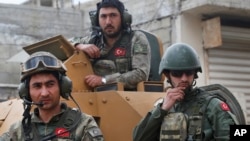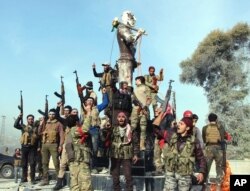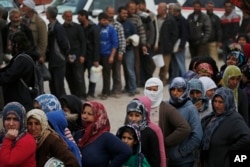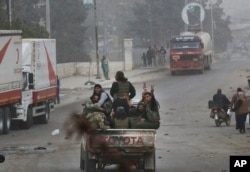Clashes in the Syrian town of Afrin are intensifying as Turkish-backed Syrian rebel factions continue fighting each other over influence in the northwestern town.
The U.K.-based Syrian Observatory for Human Rights, a rights group monitoring developments in Syria, reported that fighting, which started Saturday night in several districts of the Kurdish-majority region, had left at least 25 dead.
Local residents in Afrin were caught in the crossfire, local sources said.
"This fighting is greatly impacting civilians in the region," Redwan Bezar, a Syrian reporter who closely follows the events in Afrin, told VOA.
"For a few days now people have been stranded inside their homes because of fierce fighting and shelling. They can't even get food and other daily needs," Bezar added.
Bezar said that some houses were hit in Sunday's clashes, but no civilian casualties have been reported.
Turkey military and several rebel groups carried out an operation Sunday against another rebel group in Afrin that has been involved in criminal activities including extortion and civilian kidnapping, Turkey's state-run Anadolu news agency said.
The operation targeted Abu Khawla, leader of Shuhada' al-Sharqiya rebel group, as the Turkish military imposed a curfew throughout the city, Anadolu reported.
Turkish military and allied Syrian rebels took control of Afrin after a two-month-long military campaign that ousted the Kurdish People's Protection Units (YPG) from the region in March 2018.
Ankara views the YPG as part of the Kurdistan Workers' Party (PKK), which has been engaged in a three-decade war with Turkish armed forces for greater Kurdish rights in Turkey. The PKK is considered a terrorist organization by Turkey, the United States and the European Union.
Divisions
But Turkey has been struggling to bring law and order to Afrin in part due to differences among Syrian rebel groups there. Rights groups have reported regular abuses committed by Turkish-backed rebels against civilians in the Syrian town.
Some analysts say that Turkey might have to deal with the division among rebels in Afrin for some time.
"Turkey may be a victim of its own success in Afrin," Nicholas Heras, a Syria expert at the Center for a New American Security (CNAS), a Washington-based think tank told VOA.
"Turkey's rapid conquest of Afrin was the result of the Turkish military's competence, not because Turkey's Syrian partner forces were effective on their own," Heras added.
There are at least a dozen rebel groups in control of Afrin, including the National Liberation Front and several militant groups.
"Many of these groups act with a mercenary mindset because they stay in Afrin for the money that Turkey provides them," CNAS's Heras said.
Other analysts like Kyle Orton, a Syria researcher in London, believe that Turkey can form a unified Syrian rebel front in Afrin, but for that to happen Ankara would have to commit more resources to the town.
"More Turkish troops would be needed in the short-term to maintain order," Orton said.
"Where the Turks have significant forces, such as near the border … around Jarabulus and al-Ra'i, there is a notably better security and political coordination among the rebels," he added.
Orton said, "Unity would also need money over the longer-term to recruit and train technically competent and more upright Syrians to fill the security and administrative roles, replacing some of the semi-criminal organizations that call themselves rebel groups that are being relied upon in Afrin at the moment."
YPG
The Kurdish YPG, which has the backing of the U.S. in the fight against the Islamic State militants, has occasionally carried out attacks against Turkish troops and their Syrian proxies in Afrin.
Some analysts say the ongoing conflict among the pro-Turkey Syrian rebels could be of benefit to the YPG.
The YPG "is clearly benefiting from the disarray in the security situation in Afrin," Orton said.
"Their insurgency has notably stepped up in that zone recently, including a series of grisly targeted assassinations," he added.
Heras of CNAS said that "many of the Syrian groups in Afrin are not capable of stopping the YPG-led insurgency there."
"With partners like this, the Turkish military will have to take a different approach, which is to have a firmer handle on Afrin," he added.
Turkey also maintains military presence in the nearby province of Idlib, where a shaky cease-fire, brokered by Turkey and Russia in September, has avoided a major Syrian government offensive against the last main rebel stronghold in Syria.







